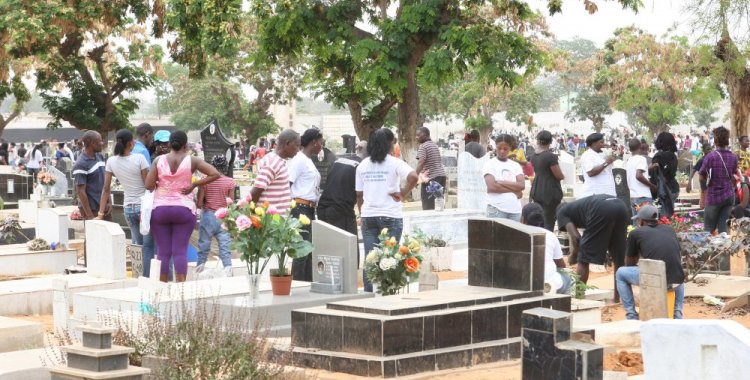Guilherme Augusto Dias is one of those cases. He has been "hunting for deaths" in the capital for three months, a strategy that involves attending funeral ceremonies for strangers and then eating at the meal offered by the family.
The 40-year-old unemployed explains that the intention is also to give some comfort to those who lose a loved one, is to "come to death and participate in it".
In Angola, it is traditional practice, after a funeral, for the deceased's family to offer a meal in his honor, usually consisting of 'funge' (maize or manioc flour porridge) and palm oil beans and where everyone , from neighbors to family and friends, or even strangers can attend.
Hundreds of people flock daily to Luanda's cemeteries, some to pay tribute to the dead or bury a relative, others looking for a way to assuage an empty stomach.
The well-known "death hunters" say that this mechanism constitutes an escape to satisfy hunger and overcome difficulties because they pass daily to support themselves, a practice in which many have been immersed for months.
At the entrance to the Santa Ana, municipal cemeteries of Viana or Camama, in Luanda, these, among the dozens that flock to the holy fields, are often mistaken as relatives of the deceased.
Last week, Guilherme Dias was detained by the police because he was mistaken for protesters who had gathered at the Santa Ana cemetery.
"This happens once in a while (looking for deaths), but this time I was surprised, I've been doing it for three months and I've never had any problems of the kind," he told Lusa at the Luanda court, where he was tried and acquitted because they had nothing to do with the process.
Guilherme Augusto Dias, who was part of the group of activists acquitted by the Luanda District Court, after being arrested on April 8, following an attempt to hold a demonstration, still has memories of the days he was detained.
"In the first station we were placed in a cell in poor conditions, we spent the night on the floor, there was no bathroom to relieve ourselves, there was no water. We spent the night like that", he lamented.
João Baptista Kifuta, 23, the last of which dedicated to "hunting for deaths" says that waiting for a funeral and then heading to the 'death's house is the way he found to be able to feed himself.
"It happened that I was in Santa Ana (cemetery) waiting for a funeral, which is not part of my family, I always do that. Every month, two or three times I go there waiting for a funeral so I can feed myself" , reported to Lusa.
According to the young man, who is unemployed, this is a practice that brings many people together. "I also meet (at the door of the cemeteries) other people with the same intention, I have been in this life for a year", he stressed.
Detained under the same circumstances, this "death hunter" also recalled the "very bad" days when he was in a cell for the first time: "I never experienced that kind of thing, I was just crying and in the cell I didn't even have conditions, there was no water and no food. It smelled really bad and it was the first time I was arrested".
Guilherme Augusto Dias and João Baptista Kifuta, "death hunters" recently "hunted" as protesters by the police, were released after being acquitted of the crimes of participation in a riot and disobedience to the dispersal order.
The group includes 20 young activists acquitted last week by the Seventh Section of the Luanda District Court and who intended to demonstrate against the choice of the company Indra to manage the electoral process of the elections scheduled for August and for the release of political prisoners.







